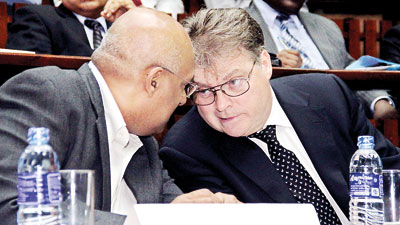Consistent policies, stability road to success in attracting investors, US official says
View(s):Governments (anywhere) need to have consistent, clear policies and stability if they are to attract foreign direct investment (FDI) , a visiting US trade envoy said on Thursday.
Told by reporters at a media briefing in Colombo that Sri Lanka’s inconsistent policies often deterred foreign investment, Michael Delaney, Assistant U.S. Trade Representative for Central and South Asia, said:
“I am not referring to Sri Lanka. But any government that wants to attract FDI must have predictable, consistent clear policies. This is very important and stability is very important. Most companies that want to invest have a long term plan to stay for 20 years. Clear, predictable consistent policies are a formula for success”.

Ceylon Chamber of Commerce Chairman Suresh Shah and Michael Delaney in conversation. Pic by Indika Handuwala.
Mr. Delaney attended the U.S.-Sri Lanka Business Forum co-hosted by the American and Ceylon Chambers of Commerce and the Ministry of Industry and Commerce which coincided with the 11th Trade and Investment Framework Agreement (TIFA) Joint Council Meeting in Colombo.
He responded to questions on a range of issues including the US GSP which ran into some problems on labour rights some years back and was resolved through the setting of a labour sub-committee, and said he met with government, labour unions and the business community.
On labour issues, he said he met the Labour Minister and the discussion was a ‘useful exchange’, and was told that labour laws here undergo constant change.
Unions here, particularly those supporting the rights of workers in free trade zones, say despite ILO regulations, unions are not allowed to freely operate in these zones. Mr. Delaney said post-war, Sri Lanka saw strong growth last year, stronger than its South Asian neighbours leading to higher incomes.
“While there is growth momentum, I believe there is considerable unrealized potential, and with the right policy mix you could grow faster. Sri Lanka has very ambitious development plans; we have seen some of these plans which require tremendous investment in infrastructure and we think US firms are well placed to provide a lot of this infrastructure,” he said.
Told that it’s the Chinese and Indian companies that are getting most of the infrastructure contracts, Mr. Delaney referred to the Chinese-funded Colombo port project where (he saw) US-build Caterpillar machines in action.
“Even in Chinese projects, there are various components that US companies can provide,” he said.
He said tourism, infrastructure and large emphasis on transport – both maritime and aviation is where growth is taking place right now in Sri Lanka, and IT and BPO is another area that the country could progress given its highly educated workforce and high education standards.
“Historically Sri Lanka has had an edge in accounting and there are great outsourcing options here,” he said.
Mr. Delaney, asked why there is no significant US investments after the war ended in 2009, noted that the relationship (between the two countries) is a different model. The US is Sri Lanka’s biggest apparel customer, the product is the biggest foreign exchange earner and this relationship model is far greater than any FDI coming in.
“The US profile in Sri Lanka’s economy is much larger that what the FDI suggests,” added Mr, Delaney, who says he has been visiting Sri Lanka for the past 43 years.
| Sri Lanka’s tea should be marketed like French wine, a US trade official says
Sri Lankan tea is the best in the world but is not properly marketed, noted Michael J. Delaney Assistant US Trade Representative for Central and South Asia speaking to the Business Times on the sidelines of Sri Lanka – USA Business Forum on Thursday. Despite being an avid coffee drinker, he said that Sri Lankan tea is the best in the world. “But it’s not marketed properly. For an example, France’s famous red Bordeaux wines aren’t just sold in jugs. Similarly Sri Lankan tea should be sold (value added).” Explaining Chevron’s experience in doing business in Sri Lanka, Kishu Gomes, Managing Director Chevron Texaco PLC said there’s a satisfactory policy framework in the country where there’re no restrictions on repatriation of earnings, service charges, capital and on foreign exchange transactions relating to current economic payments. “We have a strategic location with a proximity to South Asia and the Far East to access inputs and reach global markets (high frequency of sea and air transport). There’s also a skilled work force at competitive cost and they are reputed for its precision, quality and productivity.” Explaining the pluses, of doing business in Sri Lanka, he added that in Chevron’s line of business, there’s growing energy/petroleum demand. “Driven by investment, enhancing quality of life and increasing vehicle population, the country generally has inelastic consumer demand on the back of a very resilient economy which recorded 7.8 per cent GDP growth in 2013.” He mentioned that 28 per cent corporate and 24 per cent employee tax are relatively good (policies). “There’s access to key decision makers when in need while local legal, tax and finance expertise are on par with the best,” he said, adding that there’s relatively low real estate cost. There are many options of raising capital and the country has a wellperforming stock market,” Mr. Gomes added. Delving on areas for improvement, Mr. Gomes said that there’s lack of market/industry regulation where the shadow regulator is without power and there are delays in implementing the Petroleum Act. “Complexity in taxes and duties at central government and provincial level is an area for concern as is the delay by the government organizations in resolving issues/disputes.” He also noted that the scale of the local market is small for most industries. The inconsistency in decision-making discourages investors, he said, citing the proposed Land Bill as a contentious area. “There should be labour law reforms to create a more investor friendly climate,” he said, adding that ‘balancing patriotism and FDIs’ is also required. |


